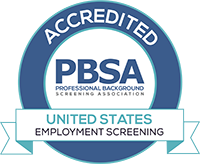BLOG
Madison Square Garden’s $1.3M Background Screening Settlement
September 3, 2019
The employer agreed to pay $1.3 million to settle a class-action lawsuit regarding its background screening practices.
About The Lawsuit
A class-action lawsuit filed by Clint Millien and Felipe Kelly claimed that Madison Square Garden was utilizing discriminatory hiring practices. The case made two claims against the employer:
The first alleged that Madison Square Garden denied employment to candidates without providing a copy of their background check. The Fair Credit Reporting Act, a federal law that protects consumers, stipulates that if an employer wishes to take an adverse action based on the results of a background report, the subject must first receive a copy and be given time to file a dispute if necessary. This is done to help ensure that the employer is only considering accurate, current information that can legally
A second claim alleged that Madison Square Garden had a policy of revoking conditional job offers for applicants who did not disclose a criminal history. This was said to have a “disparate impact on minority applicants.”
Upon reviewing the claims, Madison Square Garden agreed to settle the case for $1.3 million.
$1.3 Million Settlement
The settlement money will be disbursed in the following manner:
· Each person who was not employed by Madison Square Garden due to a record on their background check will receive $200.
· People who are able to show they were eligible for hire and would likely have been selected if they had disclosed a criminal record initially will be awarded $1,700 each.
· $519,800 will be paid as relief to putative members of the class-action lawsuit.
· An additional $750,000 will be allotted to cover attorney’s fees.
Madison Square Garden Makes Other Concessions
In addition to the payout, Madison Square Garden agreed to make changes to their hiring policies. The employer will:
· Only require candidates to disclose convictions that happened within the last five years.
· Not revoke conditional job offers because a candidate did not disclose a warrant.
· Not require candidates to disclose marijuana convictions, unless it was for an intention to sell.
· Give each applicant a copy of their background check report before denying employment. Job seekers will then have an opportunity to dispute the results of their report if they believe something is inaccurate.
· Reduce the amount of time that people are required to wait to apply for positions after previously applying.
Takeaway For Employers
Employers throughout the United States should be aware of ongoing efforts to help individuals with minor or outdated criminal convictions find employment today. This is part of a Second Chance Movement that includes laws that prohibit employers from asking about convictions on job applications, create easier methods to have old criminal records expunged and more. The primary goals are to help people who are looking for a fresh start after serving their time, reduce the rate of recidivism and give employers more options to find qualified workers.
Every employer is still encouraged to run comprehensive criminal background checks on all candidates before making any hiring decision. While millions of Americans have minor records that would not make them ineligible for most positions, violent, sexual or other serious convictions do disqualify a person. Employers must be able to show they are performing due diligence to only hire safe, trustworthy individuals who do not pose a risk to other employees, customers or the public.
When you’re hiring, a background check will give you the facts you need to make informed decisions and create a safe workplace. The team at Backgrounds Online can help you customize background screening packages that are perfectly tailored for any position. Contact us for expert assistance Monday through Friday from 5am to 6pm PT.







